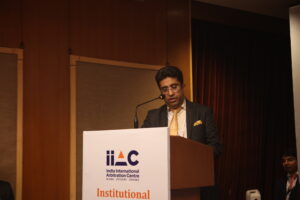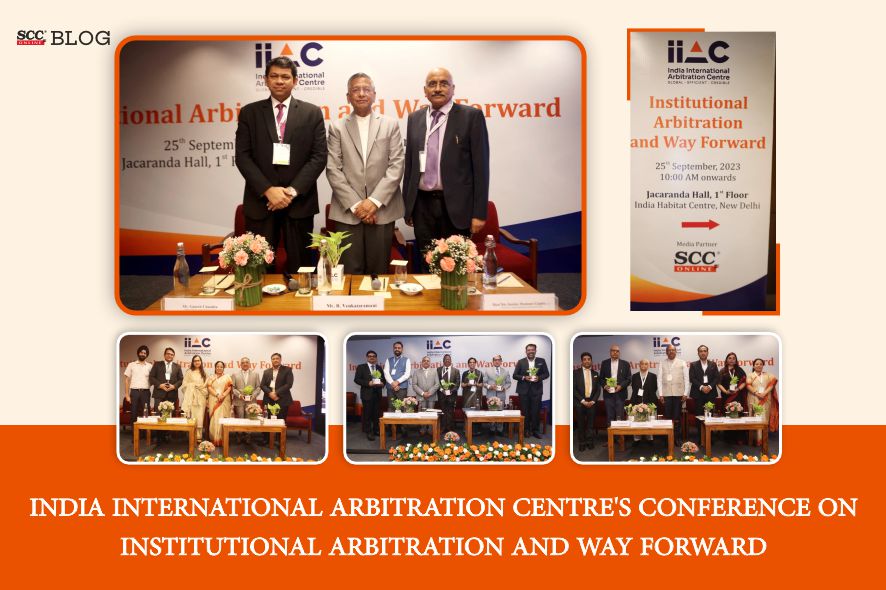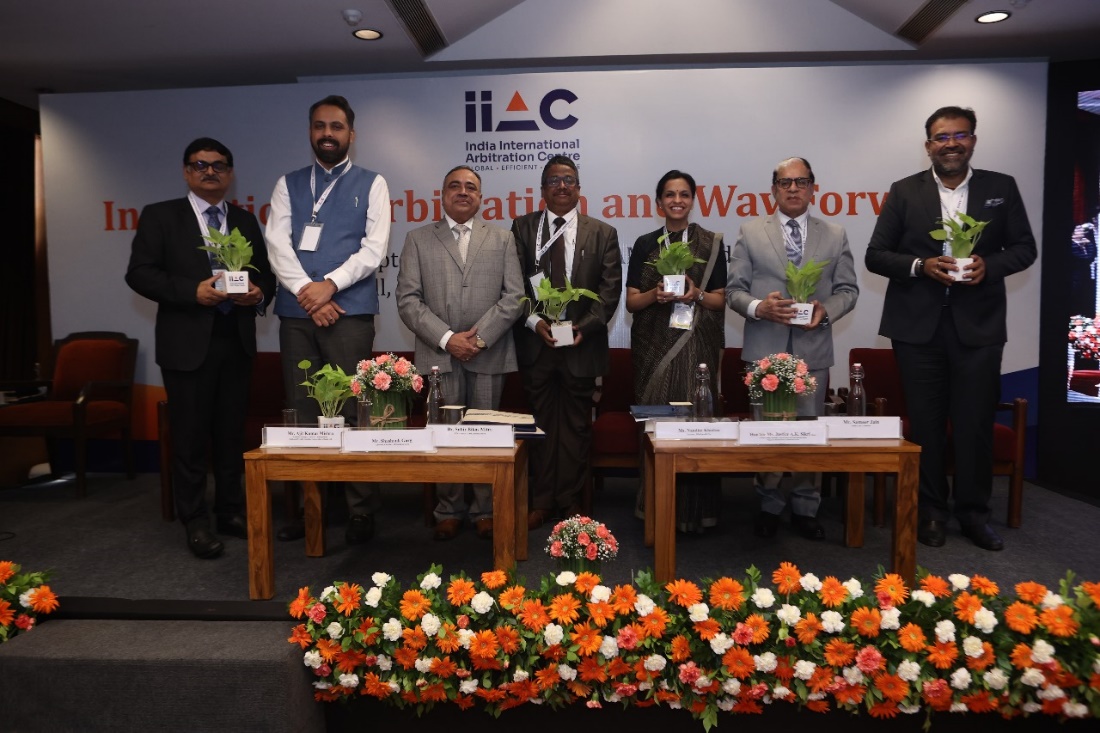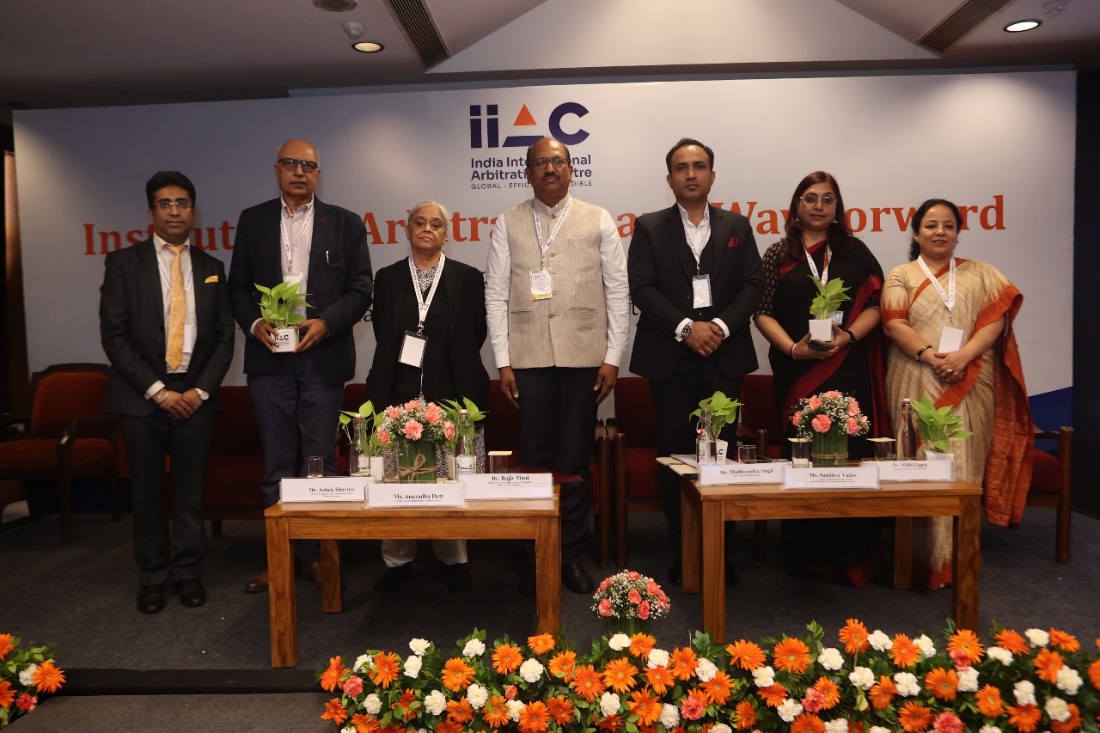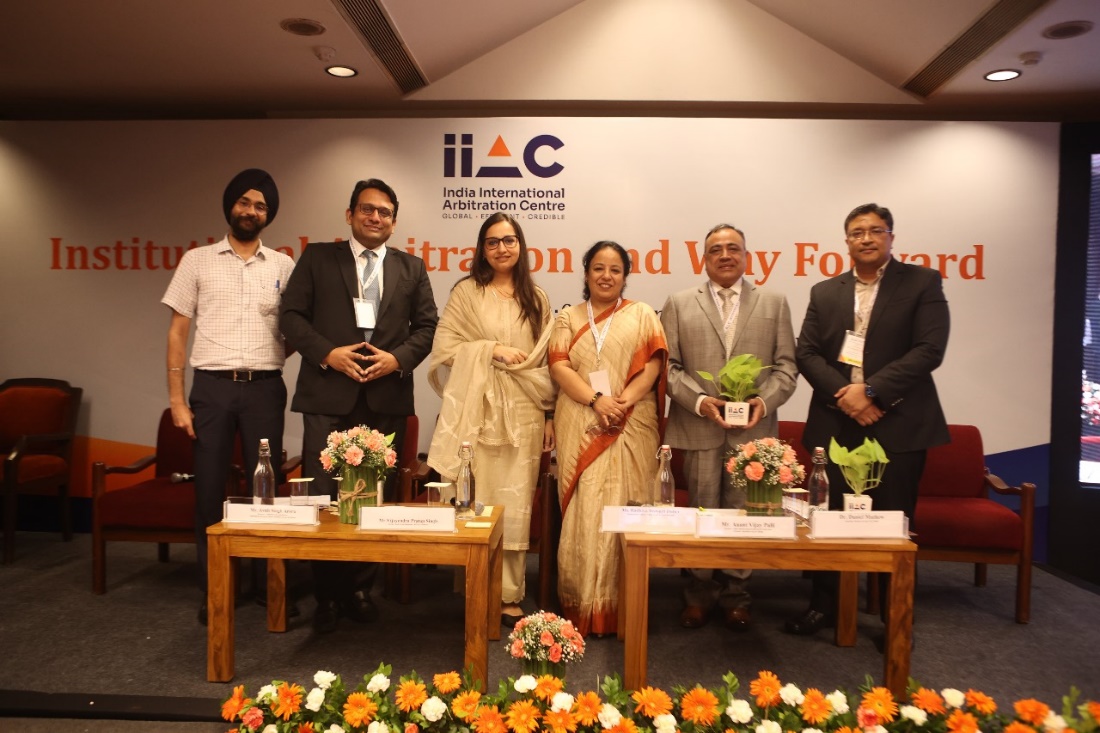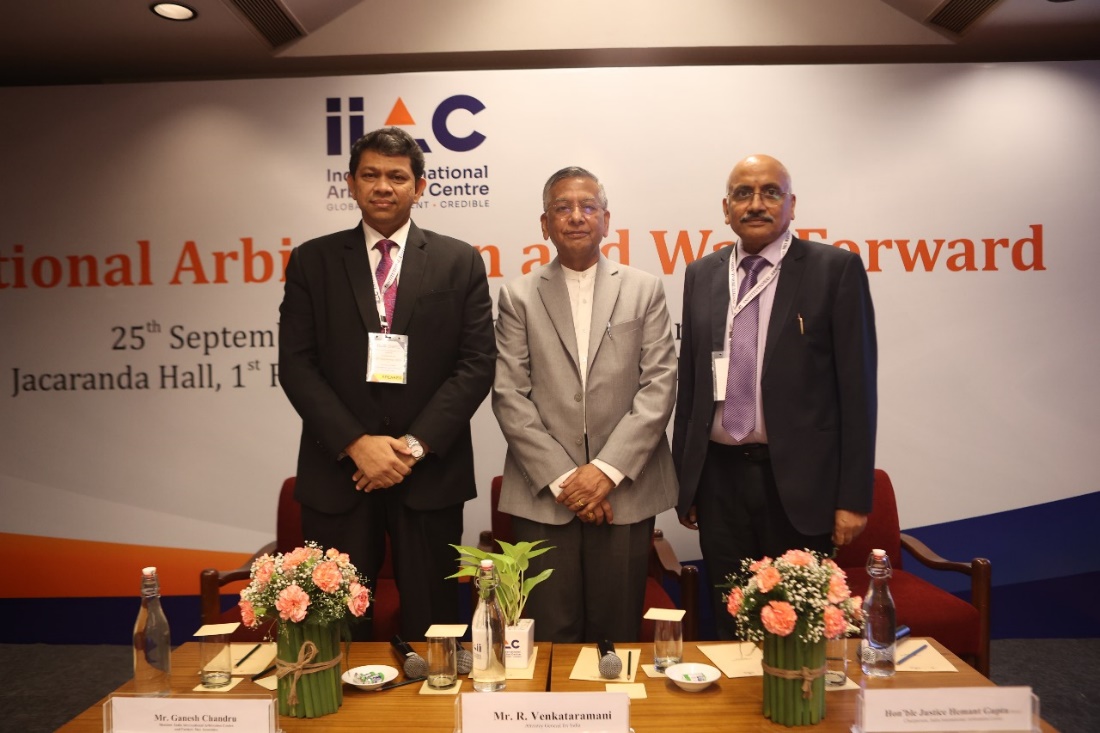India International Arbitration Centre (‘IIAC’) organised a conference on Institutional Arbitration and way forward on September 25, 2023.
INAUGURAL SESSION
The Inaugural session commenced with an address by Dr. TK Vishwanathan, Former Union Law Secretary. He remarked that UNCITRAL model law on International Commerical Arbitration is based on experiences of western countries. He suggested that India needs to think differently, and have to see the cost of the arbitration system.
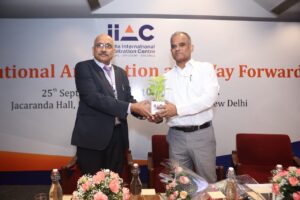
Justice Hemant Gupta (Retd.), Chairperson, IIAC in his address quoted that “India is one of the growing economic powers now, the Public Sector Undertakings (‘PSUs’) are growing, but the issue is that they end up in legal issues. It’s time to change the mindset, it should be that there is no time for ad hochism but institutional arbitration”.
powers now, the Public Sector Undertakings (‘PSUs’) are growing, but the issue is that they end up in legal issues. It’s time to change the mindset, it should be that there is no time for ad hochism but institutional arbitration”.
He also said that “drafting of an agreement by the PSUs is another issue, there is a need for a robust in-house mechanism. The clause of the agreement needs to be examined minutely”.
He suggested that whenever disputes go to the Court the PSU’s can give a declaration that they need institutional arbitration and not Ad hoc arbitration.
Dr. Niten Chandra, Secretary, Department of Legal Affairs, Ministry of Law & Justice said that “we have been pursuing the idea of setting up an international arbitration centre for several years and now under the chairmanship of Justice Hemant Gupta (Retd.) it’s been possible.
Linking India’s economic growth with dispute resolution, he said that “India has been unique, compared to other countries in terms of pace of economic growth. This has happened despite the prevailing negative sentiment across the planet. The PSU’s have played a vital role in economic growth. We must have strong institutional mechanisms to manage these economic contracts”.
He further said that “we must expeditiously get the disputes settled by Arbitration, especially through IIAC”.
SESSION 1
TOPIC: Legal and Practical Aspects of Arbitration in India
This session was moderated by Mr. Sameer Jain, Partner, PSL Chambers. The Panelists were Justice AK Sikri (Retd.) Former Judge, Supreme Court and International Judge, Singapore International Commercial Court; Nandini Khaitan, Partner, Khaitan & Co.; Dr. Subir Bikas Mitra, Advisor, GAIL India Ltd.; Shashank Garg, Advocate, Chambers of Shashank Garg; and Ajit Kumar Mishra, GM, Contract Management, Dedicated Freight Corridor Corporation of India Ltd.
While talking about arbitrability of disputes, Justice AK Sikri reiterated that disputes giving rise to rights in rem are not arbitrable and rights in personam are arbitrable. Further, citing A Ayyasamy v. A. Paramasivam, (2016) 10 SCC 386 , said that fraud has both criminal and civil implications, thus, fraud is arbitrable.
He suggested a robust statutory regime and said that the judicial approach should be arbitration friendly.
Comparing institutional arbitration and Ad Hoc arbitration, he said that the former in so many ways is far better than the latter, as the problems of Ad hoc arbitration are taken care of in Institutional arbitration
He said that there are two pillars of arbitration:
1) Party autonomy
2) Impartiality and independence of Arbitrator
Nandini Khaitan also discussed various cases on arbitrability of disputes and talked about recent developments in Arbitration Law.
Dr. Subir Bikas Mitra said that “in civil disputes the allegation of fraud cannot prevent the dispute from going through Arbitration”.
Shashak Garg said that “by the nature of disputes there are certain matters which are not arbitrable”.
Talking about clever drafting, he suggested that one must not go with the template drafts. He also talked about the importance of clever construction of an arbitration clause.
Ajit Kumar Mishra remarked that “arbitration clause should be drafted in a manner that should resolve disputes, however nowadays it is becoming a matter of dispute itself.
He further said that casually drafted arbitration clause will not help the parties in Arbitration
He suggested adopting institutional arbitration to prevent problems arising from casually drafted arbitration clauses.
SESSION 2
TOPIC: Familiarising with IIAC (Conduct of Arbitration) Regulation 2023
Karan Kanwal, Deputy Registrar, IIAC discussed about the composition of IIAC.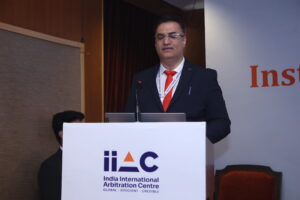
Ganesh Chandru, Member, IIAC and Partner, Dua Associates remarked that “there is a need for a national institution to run arbitration efficiently”. He further discussed the IIAC (Conduct of Arbitration) Regulations 2023.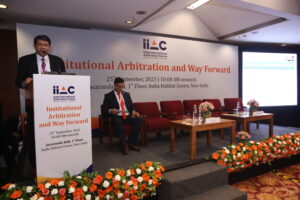
SESSION 3
TOPIC: Institutional Arbitration: The Time has come!
This session was moderated by Dr. Nidhi Gupta, Associate Professor of Law, NLU Delhi. The panelists were Dr. Ashok Sharma, FCIArb, Founder & CEC Federation of Indian Corporate Lawyers; Madhvendra Singh, CEO, Gujarat Maritime Cluster; Dr. Rajiv Mani, Additional Secretary, Department of Legal Affairs, Ministry of Law & Justice; Anuradha Dutt, Founder and Managing Partner DMD Advocates; and Sandhya Yadav, General Manager, Chief Legal Services, ONGC.
The panelists discussed why one must prefer Institutional Arbitrations over Ad hoc Arbitrations.
Dr. Rajiv Mani said that “IIAC was established due to the recommendation of the high-level committee and to push institutional arbitration in some way”. Further, he suggested that there is a need for credible arbitration centres to improve the ease of doing business and to effectively compete with other arbitration institutions established in other parts of the world.
Dr. Ashok Sharma said that “good arbitration institutions are developing in India, thus, there will be more acceptance to institutional arbitration than Ad hoc arbitration”.
Answering how IIAC can compete with other existing arbitration institutions, he said that “IIAC should adopt a proactive approach and not a bureaucratic approach”.
Anuradha Dutt said that “institutional arbitration is not growing because it’s not bringing something extra to the table. What is missing is that the rules are not updated” She also remarked that Singapore rose so much in arbitration because they have consistency.
She said that “for India to be made a seat of Arbitration there needs to be a change in the mindset of the system. The initial goal should be of venue”.
Madhvendra Singh said that “institutional arbitration and Ad hoc arbitration can co-exist. The narrative needs to be that how institutional arbitration is better”.
He said that “institutional arbitration provides certainty of time and procedure”.
Sandhya Yadav said that “the time has come for institutional arbitration, and as a government organisation we are ready for it”.
She also suggested that all PSU’s must adopt institutional arbitration as there is high level regulatory management.
SPECIAL ADDRESS
In the special address, Abhinav Bhushan Chief Executive for Asia & International Arbitrator, Member at 39 Essex Chambers talked about Institutional Arbitration, which is the key to promote investor confidence.
He said that the “economies have moved from the north to the south and from the west to the east”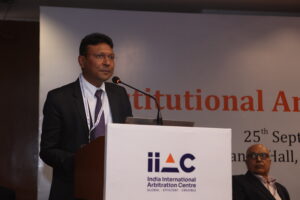
He further remarked that “to make in India, resolve in India is critical and institutional arbitration is key to promote investor confidence. This is the key responsibility of not just the lawyer and institutions and judges, but equally of the clients of arbitration which includes the senior PSU officers”
Concerning IIAC Regulations, he said that the PSUs can use these regulations not just in India seated arbitrations but also in foreign seated arbitration
SESSION 4
TOPIC: Strengthening commercial dispute resolution mechanism through Med-Arb, Arb -Med-Arb.
This session was moderated by Dr. Daniel Mathew, Associate Professor of Law, NLU Delhi. The panelists were Anant Vijay Palli, Member, IIAC and Advocate, Supreme Court of India; Radhika Biswajit Dubey, Independent Counsel Arbitrator & Trained Mediator; Vijayendra Pratap Singh, Partner and Head litigation, AZB & Partners; Avnit Singh Arora, Director, Arbitration & Conciliation, Department of Legal Affairs, Ministry of Law & Justice.
Vijayendra Pratap Singh said that “the best mechanism for dispute resolution is efficient, economic, effective and transformational”.
He remarked that Arbitration clauses are like a ‘tadka’ which adds a flavour to an agreement”. He further talked about the 3Cs from which the fraternity fears, that is the Comptroller and Auditor General, Central Vigilance Commission and the Central Bureau of Investigation.
Concerning confidentiality, he said that “it’s important that parties do not discuss what they want to keep confidential. They can give their mediator cum arbitrator, specific consent-based agreements.
He further devised the term ‘be calm and mediate’.
Radhika Biswajit Dubey said that “Mediator is a facilitator and arbitrator is an adjudicator. The transition between both is the challenge”. She suggested well-defined confidentiality agreements.
She also mentionedthat “the language of the clause needs to be absolutely clear. We need to understand the needs of the parties. We need to understand the sector.” Further , she added that “if commercial disputes are done properly, then solutions will come”.
She also remarked that “there is a lack of clarity in lawyers and parties about the arbitration procedure”.
Anant Vijay Palli said that Singapore allows Arb-Med-Arb.
Avnit Singh Arora said that “the concept of mediation got subsumed into conciliation by the newly passed Mediation Act. This Act is an attempt to ensure that it’s institutional mediation. Confidentiality is protected under the Mediation Act. It also bars a mediator from being an arbitrator”.
VALEDICTORY SESSION
The Valedictory marked the presence of R.Venkataramani, Attorney General for India.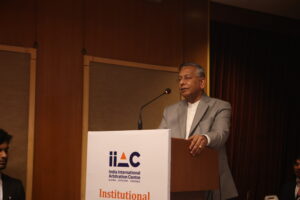
In his speech he said that it’s time for us to look for a global framework, it’s time for a New Delhi Convention. He proposed for the New Delhi Convention to be more fundamental. He suggested that the cliches about mediation need to be cleared.
Further, he made an important announcement for creating the All-India Arbitration Bar.
The event ended with a vote of thanks by Vinay Kumar Sanduja , Registrar, IIAC.
